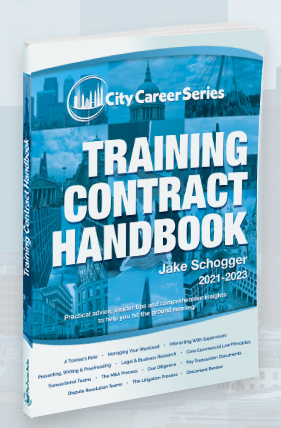
The Future Lawyer Weekly Update – w/c 7th December
December 6, 2020
“Should a COVID-19 vaccine, if developed, be compulsory to all those healthy enough to have the injection?”
December 15, 2020Review by Camilla Uppal, law graduate from the University of Kent and future trainee solicitor at a top 55 UK law firm.
My background
After graduating from my law degree in 2012, I embarked on a career in alternative dispute resolution (ADR). Over the past 8 years, I have gained extensive office experience in a variety of roles, from administrator level up to my current role as quality assurance – a position of responsibility in my organisation.
When I start my training contract in August 2022, I will have ten years of office experience under my belt. I thought it would be useful to provide some insight into my experience before launching into this book review to highlight that, no matter how much prior office experience you may have, this handbook is likely to be very helpful.
Book review
Jake Schogger and the team at City Career Series have put together a handbook with 10 chapters covering key issues trainee solicitors are likely to face.
The book appears to be unofficially divided into two parts. The first part covers topics such as ‘What do trainees actually do?’ and ‘Trainee Soft Skills’ which generally focus on the skills trainee solicitors require to succeed, and how to approach common issues trainees are likely to face.
Despite having office experience, it is clear that there are many things I will still need to learn as a trainee, both in terms of legal knowledge and also soft skills which are just as important as technical knowledge. Jake has drawn on his experience as a trainee solicitor at a Magic Circle law firm to provide the reader with answers to the questions we don’t even know we will have during our training contracts.
One of my favourite sections is the ‘common appraisal feedback’ section, where Jake shares real examples of positive and negative feedback provided to trainees during their training contracts. In my opinion, this section is extremely valuable because it allows the reader to learn from the mistakes that other trainees have made and avoid common blunders.
I try to be proactive and enthusiastic in every task that I take on at work which is an attitude that I plan to continue with during my training contract. The Training Contract Handbook enables me to do this by providing specific and actionable examples of how I can show initiative and impress my supervisor. Again, this is really valuable insight that, without this book, I would have needed to learn ‘on the job’ or from speaking to others. I still plan on doing research of my own by reaching out to former trainees at my firm to get some advice, but this handbook is a great resource which collates key tips and packages them up in an easy to read format. I will definitely be keeping this on my desk when I start my training contract!
The second part of the book focuses on the technical side of things. There are chapters on ‘Core Commercial Law Principles’, ‘Mergers & Acquisitions’ ‘Key Transaction Documents’ and ‘Dispute Resolution’. In these chapters, you will find explanations of hundreds of key legal concepts, terminology and common legal jargon.
I think this is a great resource which you can refer to during your training contract if you are not quite sure how to approach a piece of work, or for some context around how the piece of work fits in to the overall project. Of course, this book is unlikely to be substitution for asking questions if you really don’t know what to do. However, in my experience, it is always better to approach a senior member of staff with an opinion on how you should carry out a task, rather than just saying that you are stuck. I think this book will provide me with a great starting point for so many different tasks.
I have tried to look at the handbook with a critical eye in the aim of providing a balanced book review. Without having started my training contract, I do not feel that I am able to fully explore the drawbacks of the handbook as I haven’t had the opportunity to use it in practice. The only potential downside is that some of the technical topics covered in the second part of the book might be covered on the LPC. That being said, I suspect that this book covers the most common trainee tasks in far more depth, with more of a practical focus than the LPC which can sometimes feel like a high-level whistle stop tour of legal procedure. Even if there is a small amount of duplication, I still think this is a really valuable resource as having key information in one place is really convenient. It is unlikely I will have access my LPC folders at work and let’s be honest, I won’t be able to remember every single thing from the course!
Furthermore, I also think this book goes one step further than simply providing information, by providing a number of ‘practical tips’ throughout the book, containing important points to keep in mind when completing specific legal tasks. In my view, this handbook is like having a legal mentor guiding me through all the most common tasks I am likely to face as a trainee, and providing me with hints and tips along the way to help prevent me from making common mistakes.
At a price of £29.99, I think this book is an absolute steal, and City Career Series has generously offered readers of The Student Lawyer a discount code for 10% off the online store. Just enter the code TSL2020 at the checkout.
We are also running a giveaway for two TSL readers to receive a free copy of the book! Visit our Instagram or LinkedIn page for information on how to enter.
Disclaimer
This book was kindly gifted to me by City Career Series. Please be assured that this review contains my honest opinion and I was under no obligation to write a positive review in exchange for the gift.





